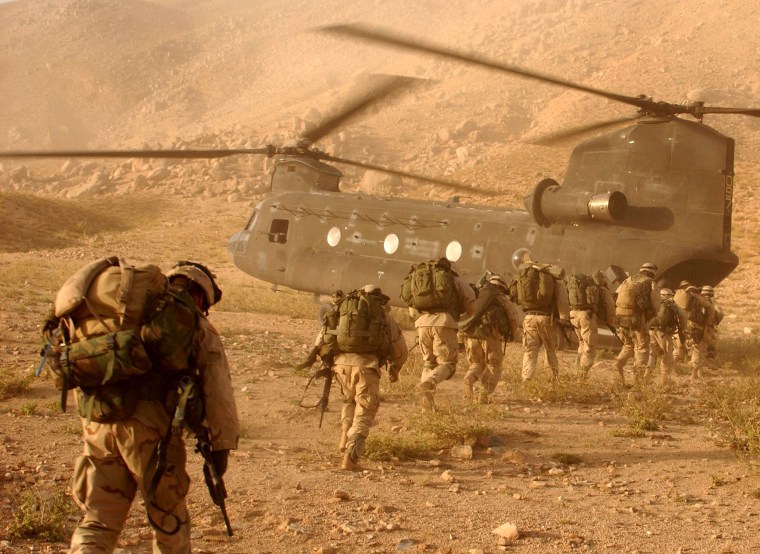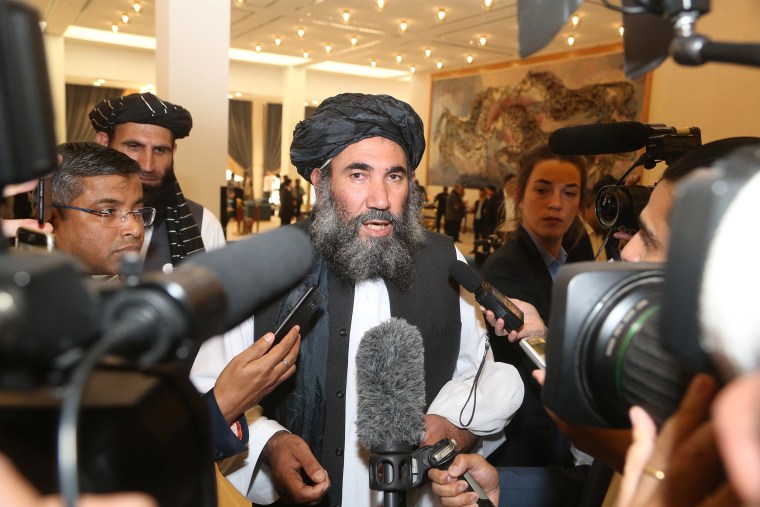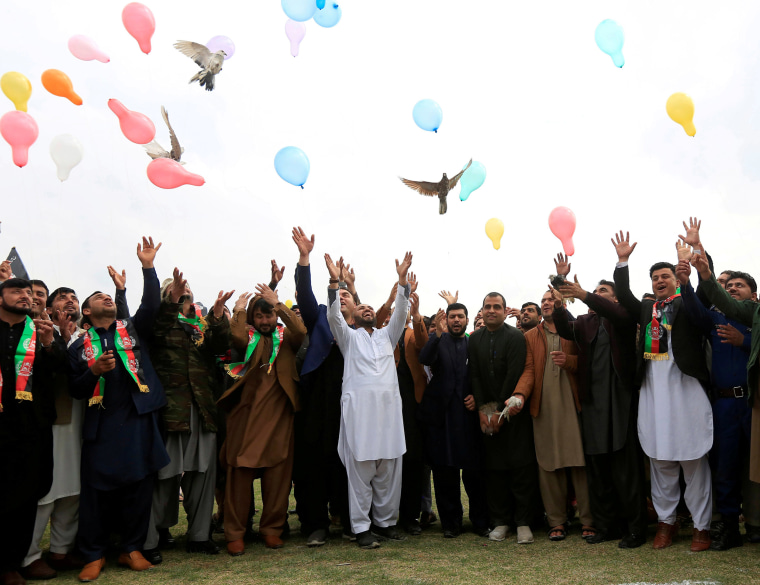DOHA, Qatar — The Taliban cheered, whooped and cried "God is Great" just moments after one of their leaders signed an agreement that could lead to the United States' withdrawal from Afghanistan after more than 18 years of war.
On Saturday in this tiny Gulf kingdom, senior American officials shook hands with the group that, as the government of Afghanistan from 1996 to 2001, had sheltered Osama bin Laden, the Al Qaeda leader and the architect of the Sept. 11, 2001, terror attacks. The U.S. agreed to work toward lifting sanctions against the group, and Taliban leaders can even look forward to a possible meeting with President Donald Trump.
In short, after nearly two decades of war with the world's remaining superpower, the Taliban look like they not only have won the war, but they are also on the way to shedding their status as international pariahs.
“Even if we don’t say that the U.S. is defeated in Afghanistan, it is an open secret now that they are defeated,” said Anas Haqqani, a senior member of the Haqqani network, considered to be the most formidable of the Taliban’s fighting forces, who was recently released from an Afghan jail in exchange for two Western professors taken hostage by the Taliban in 2016.
In the agreement aimed at ending Washington's military entanglement in Afghanistan — America's longest war — the U.S. agrees to withdraw all its forces from the country in 14 months, although a complete pullout would depend on the Taliban meeting its commitments, including cutting any ties to terrorist groups.
Secretary of State Mike Pompeo warned Sunday that the path ahead would be "rocky and bumpy," but said it was time to move forward.
"No one is under any illusion that this will be straightforward," he said on CBS' "Face the Nation." "We've built an important base where we can begin to bring American soldiers home, reduce the risk of the loss of life of any American in Afghanistan, and hopefully set the conditions so the Afghan people can build out a peaceful resolution to what for them is a 40-year struggle."
The U.S. has 12,000 to 13,000 troops in Afghanistan.
For the Taliban, getting the U.S. to agree to withdraw is akin to the U.S.-backed mujahedeen, or "holy fighters," pushing out Soviet troops in the 1980s and earlier, to the Afghans declaring independence from Britain in 1919.
This sense of celebration and victory spilled into the open Saturday as Taliban leaders and members staged a small parade in the streets of Qatar before the signing ceremony.

The war has taken an enormous toll on the insurgents. Brown University estimates that between 2001 and October 2018, some 40,000 opposition fighters were killed in Afghanistan. While it does not give breakdowns on how many of these fighters were Taliban members, they are by far the largest insurgent group in the country.
The war has also inflicted a deadly toll on the Afghan people. While the Taliban steadfastly deny they target civilians, according to the United Nations the group was responsible for almost half of the more than 10,000 civilians who were either injured or killed in Afghanistan last year.
There were around 2,400 U.S. military deaths between 2001 and 2018, according to Brown University's Costs of War project.
'This was the easy part'
The Taliban say they feel victorious now, but the war isn't over yet.
The group has made a substantial concession in agreeing to enter into talks for the first time with Afghan government officials, representatives of the opposition and members of the civil society on March 10.
It is this commitment — along with a pledge to prevent Al Qaeda or other terrorists from using Afghan soil to attack the U.S. or its allies — that enabled a deal between the Taliban and Washington to be brokered. And it has, at least for a moment, brought them partly out of the cold internationally.
The Taliban are betting that Trump is eager to bring U.S. troops home and will be reluctant to backtrack on the planned pullout. Once U.S. forces leave, the Taliban will be in a powerful position at the negotiating table — or if necessary — on the battlefield.
But the Taliban's rehabilitation is contingent on what comes next, according to American officials. Secretary of Defense Mark Esper said in Kabul that if the Taliban does not abide by its commitments, the U.S. would “not hesitate to nullify the agreement."

For Laurel Miller, a former senior U.S. diplomat now with the International Crisis Group think tank, “this was the easy part.”
Upcoming Afghan-Taliban peace talks "will have to tackle much more difficult issues of who gets to wield power in the country and how the government is going to be organized," Miller said in a statement Saturday.
The Taliban have persistently dismissed President Ashraf Ghani as an American puppet and rejected taking part in elections, and they have also called on Afghans to boycott votes. They have built up shadow authorities throughout the country, taking over state hospitals and schools.
And even before intra-Afghan peace talks get underway, there are already issues to iron out.
The U.S. committed in the agreement to work with both sides to secure the release of up to 5,000 prisoners held by the Afghan government and 1,000 prisoners held by the Taliban by the start of the talks.
However, the timing of the prisoner swap could prove to be contentious. On Monday, a Taliban spokesman said the talks wouldn't happen unless the prisoners were released first.
Following that, reports swirled that the Taliban had called off the reduction of violence and had ordered their fighters to start attacking Afghan forces.
